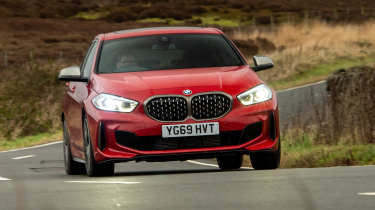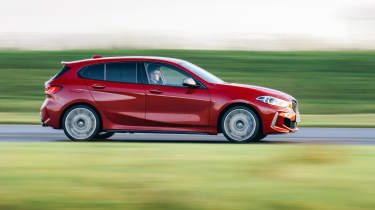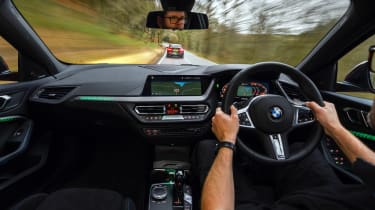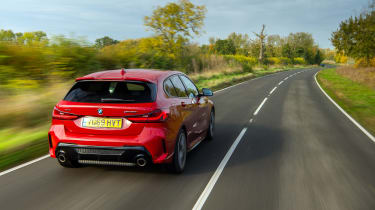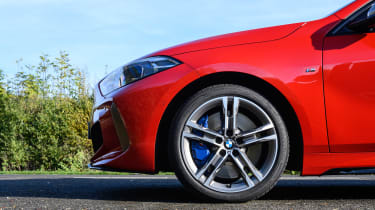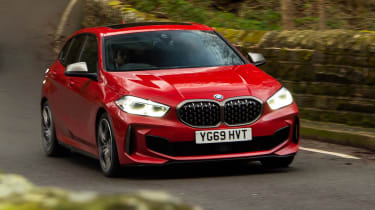BMW M135i (F40, 2019 - 2024) review – a match for the Volkswagen Golf R?
BMW’s hot hatch is a good car, but no longer a unique one, and misses the mark for pure fun
Rumour has it that the majority of previous BMW 1-series customers were unaware which end of the car was being driven. Whether that applies to buyers of the old M140i or not is a different matter, but the upshot is that for the latest generation of 1-series, BMW has chosen to base it on a predominantly front-wheel-drive platform.
The exception is the latest performance range-topper, the M135i xDrive, and as you can probably guess from the name, all four wheels are driven. Effectively, the M135i shares its powertrain with the Mini Clubman JCW, and BMW engineers reckon the new car is better to drive than ever – as well, one imagines, as being slightly cheaper to build thanks to its shared architecture.
> BMW M340i xDrive Touring Fast Fleet test – 6000 miles in the six-cylinder estate
More promisingly, the latest car is lighter than the old M140i, and has the traction benefits of all-wheel drive, lining it up as a perfect rival for cars such as the Audi S3 and Mercedes-AMG A35, rather than a rear-drive outlier. Whether all this is enough to make it more appealing to evo readers is another matter, and with a large choice of circa-300bhp alternatives in the hot hatch class, the M135i xDrive will have to be special indeed to warrant attention
More reviews
The M135i’s 2-litre, four-cylinder petrol engine is a brand-spanker from BMW and, predictably, it features all the tricks and then some: variable valve timing, double VANOS camshaft timing, what BMW describes as ‘TwinPower’ turbo technology – even though there’s just a single turbo – and ‘high precision injection’.
Whatever the marketing hyperbole BMW uses to describe its new engine, it is a serious piece of work. For starters, this new engine is light. BMW claims it weighs around 32kg less than the old 3-litre straight-six turbo from the 140i, yet its outputs aren’t that far behind (302bhp versus 335bhp from the old car), plus of course it’s much more economical and cleaner (41mpg combined and 155g/km).
Its maximum output of 302bhp occurs between 4500 and 6250rpm, while max torque of 332lb ft is available from just 1700rpm, and all the way through to 5000rpm. That’s enough energy to fire the M135i xDrive to 62mph in just 4.8sec, albeit with the aid of a full launch control system and four-wheel drive. Top speed is limited to the standard 155mph.
It’s hard to know where to start here, so how about with the new Torsen limited-slip differential at the front which, in conjunction with what BMW describes as ARB technology (actuator contiguous wheel slip limitation, borrowed lock-stock from the i3), provides the M135i with monstrous traction, and that’s before you even mention what happens at the new multi-link back axle.
In normal driving the M135i xDrive is essentially front-wheel drive, but put your foot down and, within milliseconds claims BMW, the ‘intelligent control logic’ of the xDrive system engages the rear axle and can then split torque deployment up to 50:50 between the front and rear ends. It will even allow a degree of rear-end slip, reckon BMW’s engineers, if you deactivate the DSC. It’s a very clever system that works only when you need it to and, subjectively, the transition is all but seamless as it kicks in and out.
The new One’s body is also stiffer than of old across the range, but for the 135i there are extra bracing elements front and rear and bigger anti-roll bars, plus slightly quicker electric power steering than in the regular versions. The ride height is 10mm lower with the M Sport package – which the 135i comes with as standard, like it or not – and the gearbox is an eight-speed auto with paddles from Aisin. Sadly the six-speed manual that’s available on most other new 1-series models is not available for the M135i xDrive.
Subjectively the M135i feels every bit as quick as the numbers suggest, but at the same time it feels oddly characterless and undramatic in its delivery. All the right ingredients are there for hot hatch greatness: Keen throttle response for a turbo? Tick. Very strong mid-range performance? Tick. Fast-shifting eight-speed auto gearbox with paddles? Tick. An ability to draw the far horizon towards the windscreen faster than you’d ever expect from a hot hatch? Tick.
The M135i is a brisk, well-built, capable car that no doubt ticks a few boxes on a form somewhere in BMW’s internal documents, but its 13th place result in issue 318's hot hatch mega test illustrates the difference between a car that’s merely good, and ones that get a lot closer to greatness.
You shouldn’t assess a car on what it isn’t, but it still smarts that this 1-series replaced a car that gave you not just rear-wheel drive, but also a six-cylinder engine and a manual gearbox. We’re not obsessed with drive being sent to the rear – you’ll note the exclusively front-driven 128ti beats the all-wheel-drive M135i here – but for all its faults the old car felt more authentic to BMW’s values, and simply more fun.
If there’s one thing new and old share, it’s that neither is at its best flat out. ‘You can build a flow at seven, maybe eight-tenths, but go beyond that and the rewards aren’t there for the effort you have put in,’ says editor-in-chief Gallagher. It’s not that the BMW falls apart when you push it hard – in fact, it’s quite capable, and shows that even outside of M5 CSs and the like, BMW’s engineers can still dial in a chassis. It just doesn’t really meet you halfway when you try to dig into its abilities.
The steering has a Mini-like responsiveness (not surprising, given this generation of 1‑series shares its UKL platform with the Mini brand), but it’s not especially talkative, and actually much like the JCW the M135i is throttle-adjustable without goading you into making the most of it. ‘It’s not as one-dimensional as the Golfs or Audi’s S3 but it’s not as mobile or instinctive as the two Mercedes,’ is Stu’s verdict. Meanwhile John tried turning off the ESC to see whether it would play, and found merely traction rather than jaunty angles. In this respect, it’s definitely closer to Audi’s smaller models than the AMGs.
Mini-ness extends to the B48 four-cylinder turbocharged engine too. Here a different crankshaft and pistons and numerous other alterations give it 302bhp, 74bhp more than in the JCW (and 41bhp more than in the 128ti), but it still feels like it’s simply there to do a job. It’s got enthusiastic throttle response, a surge of mid-range torque to surf around on, and the automatic gearbox it’s attached to feels a touch snappier than in the Mini, but we’d even take Hans Zimmer’s futuristic whooshing noises from BMW’s EVs over the four-pot’s flat drone.
The ride is also a bit tough on the road, but at least BMW builds the 1-series better than Mercedes does its A-class, so it should keep squeaks and rattles at bay for longer. And while Stuart isn’t keen on the slightly too-high seating position, it is at least a comfortable car in which to cover distances. To be clear, the M135i isn’t a bad car, or even a bad hot hatch, as its place in this test shows. But a lot of cars, including the front-wheel-drive 128ti, do it better.
Price and rivals
At £41,880 the M135i xDrive does seem to represent a decent amount of car for the money given how well specified it is, how sophisticated its new comms package is and how much tech its new four-wheel-drive chassis contains.
The Mercedes-AMG A35 is perhaps the BMW’s closest rival, with 302bhp and four-wheel drive, and a similar price (£46,075). Audi’s S3 Sportback comes in at £46,925 and offers more power than the BMW and AMG at 328bhp, with Volkswagen's Golf R offering up 316bhp. Of the four German options, the AMG is probably the strongest choice.
Finally, if four-wheel drive isn’t essential (and you can find one for its £50,050 list price) the 324bhp FL5 Honda Civic Type R betters them all in terms our outright performance, but is in a different category of appeal in real terms. Despite only two wheels being driven, it’s our current favourite hot hatchback, and still represents good value considering its incredible ability.

